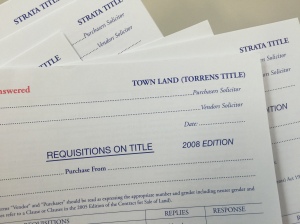Like many commercial transactions, the transfer of ownership of property is underpinned by the common law doctrine of “buyer beware” (aka “caveat emptor”). That is, the purchaser needs to make sure they make their own enquiries and carry out their own pre-purchase inspections to be satisfied as to the title and quality of the property being purchased. They cannot rely on anything said by the vendor and/or the vendor’s agent, other than what is disclosed in the Contract.
Over time, however, statutory protections have been introduced to require the vendor to assist the purchaser by disclosing certain information about the property and including certain documentation in the Contract. For example, the sale of property in New South Wales is subject to “vendor disclosure” laws requiring certain documents and statements relating to the title of the property to be included in the Contract for the Sale of Land (see section 52A of the Conveyancing Act and Schedule 1 Conveyancing (Sale of Land) Regulation 2010). These documents include a title search, zoning certificate, and sewerage diagram.
Failure to comply with the vendor disclosure laws enables the purchaser to rescind (that is, pull out of) the Contract and obtain a full refund of any deposit paid (clauses 16 and 17 of the Conveyancing (Sale of Land) Regulation 2010).
Apart from the vendor disclosure legislation, the vendor is not otherwise required to disclose other defects, such as structural defects, irrespective of their impact on the value or use and enjoyment of the property.

But what about the history of the property? Does a vendor need to disclose the fact that a violent death or even a suicide took place at the property, if such facts are within the vendor’s knowledge? Should a distinction be drawn between an actual murder and an attempted murder? What if a rape or a violent assault took place? Or what if the elderly owner passed away peacefully in their bed?
Generally speaking, no, the vendor is under no such obligation. However, the real estate agent may be so obliged.
Real estate agents are under an obligation to disclose “material facts” in relation to any property they are selling. Failure to disclose “material facts” may constitute misleading and deceptive conduct, enabling a purchaser to seek appropriate orders from the Court to have the contract set aside and an award of damages made in their favour. The agent could also be prosecuted for breaching consumer protection laws.
But what exactly is a material fact? What is material to one person may not be so material to another person. Obviously, if disclose of the fact risks the home suffering a significant drop in price, then an agent would prefer to not disclose it.
Whether or not a fact is a material fact that should be disclosed depends on whether the disclosure of the fact might affect the purchaser’s decision to proceed with the purchase. If so, then the fact must be disclosed.
Agents are also under a general obligation not to mislead or deceive:
3 Honesty, fairness and professionalism
(1) An agent must act honestly, fairly and professionally with all parties in a transaction.
(2) An agent must not mislead or deceive any parties in negotiations or a transaction.
(Schedule 1 of the Property, Stock and Business Agents Regulation 2003).
The issue of “material facts” disclosure has arisen a number of times in recent years, as reported in various media reports. Perhaps one of the most publicised cases was the Gonzales house in north-western Sydney, the scene of a horrific triple murder in 2001 by the family’s son. Following the exchange of contracts for the home’s sale in 2004, the purchasers found out about the murders and demanded a full refund of their deposit. The agent ended up refunding the deposit and fines totalling $21,000 were imposed on the agent for failing to disclose this fact.
The agent for the infamous Snowtown bank vault property mentioned in the listing:
Buyers should note that illegal activities were conducted in the old bank building and you should enquire as to the nature of these activities prior to bidding.
The agent for a notorious home in Easey Street, Collingwood, where murders took placein 1977 referred to the home as having a place in Melbourne’s “folklore” – until victims’ groups took offence, which resulted in the agent amending the wording to “history”.
The agent selling the Cremorne home of murdered businessman Michael McGurk make a conscious decision not to disclose the fact that the businessman had been murdered on the front footpath – he took the view that as the murder did not take place within the home, it was not a material fact. “The buyers would have known about its history anyway”, he is quoted as saying at the time.
The recent re-leasing of a unit where Morgan Huxley was stabbed to death in his bedroom in 2013 involved a below-market rent and a qualifying statement in the advertising: “Recent crime scene occurred”.
The different views often relate to a person’s particular spiritual, religious or ethnic background. For example, Chinese buyers are among the most superstitious and will usually avoid homes where recent deaths or unsavoury acts have taken place.
If in doubt, we suggest it would be best practice for agents to disclose all facts in relation to the property.
And if you are in the market to purchase a property, we suggest that you ask the agent: “Is there anything else about the house we should know?” Then if you do subsequently find out something about the house (a “material fact”), perhaps by speaking to the neighbours, then you may have more ground to dispute the sale.





